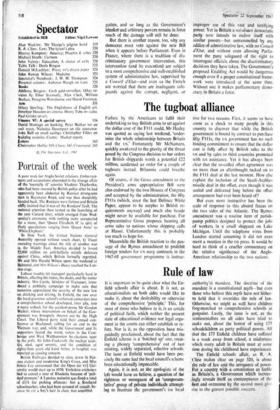The tugboat alliance
Failure by the Americans to fulfil their undertaking to buy British arms to set against the dollar cost of the F111 could, Mr Healey was quoted as saying last weekend, `under- mine the whole relationship between Britain and the us.' Fortunately Mr McNamara, quickly awakened to the gravity of the threat posed by the Congress decision to bar orders for British shipyards worth a potential £22 million, confirmed an order for a couple of tugboats instead. Britannia could breathe again.
Of course, if the Gross amendment to the President's arms appropriation Bill were also endorsed by the two Houses of Congress and accepted by the administration, the fifty Fills (which, since the last Defence White Paper, appear to be surplus to British re- quirements anyway) and much else beside might never be available for purchase. For Representative Gross proposes banning all arms sales to nations whose shipping calls at Hanoi. Unfortunately this is probably too much to hope for.
Meanwhile, the British reaction to the pas- sage of the Byrnes amendment to prohibit foreign tenders for us navy contracts in the 1967-68 government programme is instruc- tive for two reasons. First, it seems to have come as a shock to many people in this country to discover that while the British government is bound by contract to purchase fifty Fills, the us government has no such binding commitment to ensure that the dollar cost is fully offset by British sales to the us and by sales to third countries promoted with us assistance. Yet it has always been clear that the so-called offset agreement was no more than an afterthought_ tacked on to the Ft I1 deal at the last moment. How else explain the inclusion .of the Saudi-Arabian missile deal in the offset, even though it was sealed and delivered long before the offset arrangement had ever been heard of'?
But even more instructive has been the scale of response to this absUrd fracas on the two sides of the Atlantic. The Byrnes amendment was a routine item of parish- pump politics designed to protect the jobs of workers in a small shipyard on Lake Michigan. Until the telephone wires from London started screaming it did not even merit a mention in the us press. It would be hard to think of a crueller commentary on the relative significance of the Anglo- American relationship to the two nations.


































 Previous page
Previous page